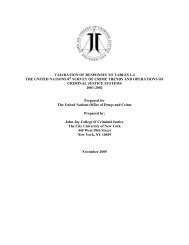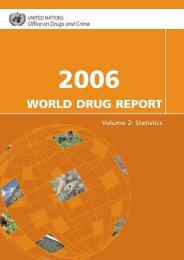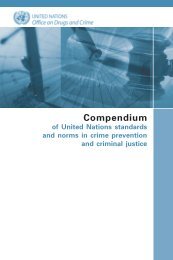Manual for Training Police on Anti Human Trafficking
Manual for Training Police on Anti Human Trafficking
Manual for Training Police on Anti Human Trafficking
You also want an ePaper? Increase the reach of your titles
YUMPU automatically turns print PDFs into web optimized ePapers that Google loves.
<str<strong>on</strong>g>Manual</str<strong>on</strong>g> <str<strong>on</strong>g>for</str<strong>on</strong>g> <str<strong>on</strong>g>Training</str<strong>on</strong>g> <str<strong>on</strong>g>Police</str<strong>on</strong>g> <strong>on</strong> <strong>Anti</strong> <strong>Human</strong> <strong>Trafficking</strong> 64<br />
1. Is gender equality a human right? Must it be respected in all cultures?<br />
2. Is gender equality a feature of your own family/circle of friends?<br />
3. What gender inequalities can you see in your own family/circle of friends?<br />
4. Who decides about what work is d<strong>on</strong>e in your own workplace? Who decides about the divisi<strong>on</strong> of<br />
tasks and resp<strong>on</strong>sibilities? What work do men do? What work do women do?<br />
5. Do you know whether the women and men in police receive equal credit <str<strong>on</strong>g>for</str<strong>on</strong>g> work of equal value<br />
and whether women are c<strong>on</strong>sidered <str<strong>on</strong>g>for</str<strong>on</strong>g> all tasks given to men police officers?<br />
6. How could you promote gender equality in your workplace?<br />
7. What deficiencies do you see overall in your own country with regard to gender equality?<br />
8. Who takes part in making decisi<strong>on</strong>s when you work with the local people?<br />
9. Who, according to you, would be more receptive to discussing gender equality c<strong>on</strong>cerns – men or<br />
women or both? Why do you think so?<br />
Note to the facilitator<br />
You may request the participants to resp<strong>on</strong>d to the questi<strong>on</strong>s displayed and follow it with a<br />
discussi<strong>on</strong> based <strong>on</strong> their understanding developed after the sessi<strong>on</strong>. It must be noted that<br />
participants may have str<strong>on</strong>g reacti<strong>on</strong>s. It is essential to clarify that sensitivity to gender<br />
c<strong>on</strong>cerns comes first and <str<strong>on</strong>g>for</str<strong>on</strong>g>emost when working with victims/survivors of trafficking.<br />
GAME FORMAT<br />
Feminist Poker 44<br />
Estimated time : 1 hr<br />
Material required : 40 cards with the statements listed below. There must be a full pack of 40<br />
cards <str<strong>on</strong>g>for</str<strong>on</strong>g> each of the groups playing<br />
Methodology : Interactive group exercise<br />
Expected outcome : 1. To enable police pers<strong>on</strong>nel to identify the causes of women’s oppressi<strong>on</strong><br />
2. To enable police pers<strong>on</strong>nel to discuss and rank these factors in order of<br />
importance<br />
3. To establish a c<strong>on</strong>sensus am<strong>on</strong>gst the participants about which are the<br />
most significant factors affecting women’s lives<br />
Activity<br />
Preparati<strong>on</strong>: Make three identical packs of 40 cards, each <strong>on</strong>e of the <str<strong>on</strong>g>for</str<strong>on</strong>g>ty with a different statement<br />
(see examples in the attached list).<br />
Explain the objectives of this activity, and tell the group that the sessi<strong>on</strong> involves a card game and will<br />
be in two parts. In Part 1, the players are divided into at least three groups, and have to complete the<br />
statement: “women are oppressed because...” according to the phrases <strong>on</strong> the cards that will be dealt to<br />
them.<br />
In Part 2, the small groups of players will have to get together to agree <strong>on</strong> five completed statements<br />
from those, which have been selected during the separate games. Players will be scored according to<br />
whether their judgments of the cards are accepted by the group or not.<br />
Part 1<br />
1. Divide the participants into three groups of eight players each. This may be varied according to<br />
the size of your group. The groups should sit around tables, or in a circle <strong>on</strong> the floor, and the<br />
facilitator deals out the cards.

















